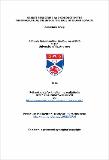Market structure and conduct in the pharmaceutical industry: the case of brand loyalty
Abstract
The Pharmaceutical Industry is important both socially and
economically; however, the market structure and conduct which distinguishes it
have brought it under the critical eye of both the regulatory authorities and the
public. This thesis describes the market structure and conduct of the industry
beginning with an historical description of its development and the market
theories behind it. It is from these theories that a number of characteristics and
behavioural traits have been identified as contrary to the interests of society.
As an oligopolistic multinational the pharmaceutical industry has been
identified with high prices and profits, a lack of price competition and heavy
product differentiation leading to high concentration ratios. Consumer
exploitation is possible via these continuously high prices and the possibilities of
ineffective, unsafe and poor quality pharmaceuticals. These outcomes emerge
from the distinct organisation of various aspects of the industry, viz. research
and development, promotional activities, pricing and profits, which are
examined. Concerns over possible consumer exploitation have led governments
throughout the world to impose increasingly stringent regulations on all of these
aspects. Such regulations have significantly changed the market structure and
conduct of the industry world-wide.
Having established the market structure of the industry the thesis
continues with an in-depth look at brand loyalty. Analysis was conducted on the
strength of brand loyalty in the face of generic competition and the attitude of
doctors to company promotional material. While brand loyalty continues to
have an impact on prescribing its strength appears to be diminishing.
The market structure and conduct of the pharmaceutical industry is
dynamic, with the present industrial climate increasingly competitive for all
those concerned. Nevertheless, while the future of the industry will be difficult,
evidence of its previous flexibility and strength suggests it will adapt and will
continue to be successful.
Type
Thesis, PhD Doctor of Philosophy
Collections
Items in the St Andrews Research Repository are protected by copyright, with all rights reserved, unless otherwise indicated.

